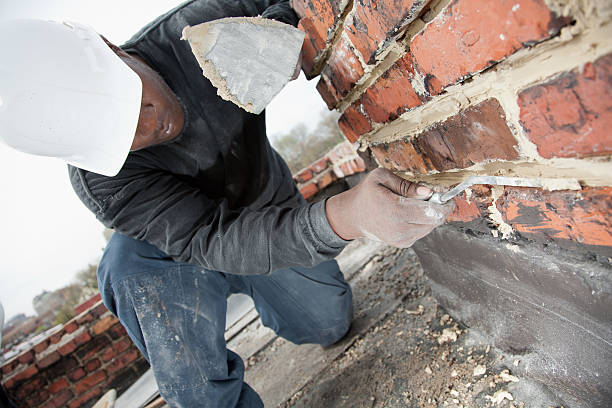Unlocking the Secrets of Lasting Masonry Construction Practices for Eco-Friendly Buildings
In the world of modern-day building and construction, the quest of lasting methods has become paramount. Among the myriad approaches to eco-friendly building, lasting stonework construction attracts attention as a reliable and durable technique that holds a wealth of untapped potential. From the option of products to innovative building and construction methods, the tricks to achieving sustainability within stonework construction are diverse and intriguing. By checking out the benefits, materials, strategies, and future patterns of sustainable masonry, a deeper understanding of how these practices can shape the future of green structures emerges.
Benefits of Lasting Stonework Construction
Embracing lasting stonework building techniques not only lowers ecological effect however also offers long-term economic advantages to building contractors and communities. By utilizing materials like recycled blocks, obstructs, and stones, contractors can dramatically decrease the carbon impact of their jobs while promoting resource efficiency. Additionally, sustainable masonry building and construction techniques, such as proper insulation and thermal mass properties, can enhance power effectiveness within structures, resulting in lowered functional costs with time.
In addition, the longevity and durability of masonry frameworks add to lasting economic advantages. Buildings built using sustainable masonry methods commonly call for much less repair and maintenance, translating to set you back savings for contractors and residential or commercial property owners. The durability of masonry products also guarantees that structures stay steady and safe, decreasing the need for frequent improvements or substitutes.
Eco-Friendly Stonework Materials
Utilizing environmentally friendly masonry materials is an essential action towards improving the sustainability of building and construction methods and minimizing environmental impact while maximizing long-lasting financial benefits. Lasting stonework products are sourced, created, and used in a fashion that decreases total ecological impact. Lasting concrete blocks include recycled aggregates and may include better insulation properties, contributing to power effectiveness in structures.
In addition, all-natural materials like adobe, rammed earth, and straw bundles give superb thermal mass homes, lowering the need for heating and cooling energy. These products are typically locally readily available, advertising regional economic climates and decreasing transportation-related carbon discharges. By choosing eco-friendly stonework products, construction tasks can significantly decrease their environmental footprint and add to the production of healthier, much more sustainable developed atmospheres.
Energy-Efficient Masonry Methods
Energy performance plays a vital function in enhancing the sustainability of stonework construction practices. One vital energy-efficient masonry strategy is the usage of thermal mass, which entails including thick products like concrete or brick right into the structure's framework Click This Link to absorb and keep warmth.

Technologies in Lasting Masonry
Current advancements in sustainable masonry techniques have caused cutting-edge strategies that are improving the building industry. One such technology is the growth of self-healing concrete, which utilizes germs installed within the concrete to recover cracks autonomously. This breakthrough not just minimizes upkeep prices yet additionally enhances the sturdiness of masonry frameworks, adding to their sustainability.
Another remarkable technology is the usage of recycled aggregates in stonework construction - masonry contractor. By integrating materials such as crushed ceramic waste or recycled glass right into concrete mixes, home builders can decrease the ecological influence of building and construction tasks while maintaining architectural honesty. This practice not just diverts waste from garbage dumps yet additionally saves natural sources, making it an essential innovation in sustainable stonework building
In addition, the assimilation of digital layout devices, such as Structure Information Modeling (BIM), is transforming the method stonework structures are prepared and constructed. BIM permits even more exact calculations, minimized material wastage, and boosted power effectiveness, ultimately bring about more sustainable structure techniques. These technologies collectively represent an appealing future for lasting masonry building in the period of environment-friendly structures.
Future Trends in Masonry Sustainability
With the innovative strides made in sustainable stonework methods, the future slate stamped concrete fads in masonry sustainability are poised to further change the building and construction sector. Among the key fads shaping the future of stonework sustainability is the boosted assimilation of innovation. Improvements such as Structure Details Modeling (BIM) and online fact simulations are being used to maximize masonry building procedures, resulting in decreased product waste and boosted power effectiveness in buildings.
Furthermore, the growth of novel sustainable products is readied to play a significant role in boosting the eco-friendliness of masonry building. masonry contractor. Developments like self-healing concrete, recycled aggregates, and bio-based binders are obtaining grip for their ability to reduce environmental influence while keeping structural honesty

Final Thought
In verdict, sustainable masonry construction techniques provide many advantages for eco-friendly structures. By making use of environment-friendly materials and energy-efficient strategies, masonry can add to a much more lasting constructed atmosphere. Developments in sustainable masonry are continually being developed to further improve the ecological performance of buildings. Looking in the direction of the future, the fad of masonry sustainability is anticipated to expand, bring about even more ecologically pleasant and energy-efficient building methods in the years to find.